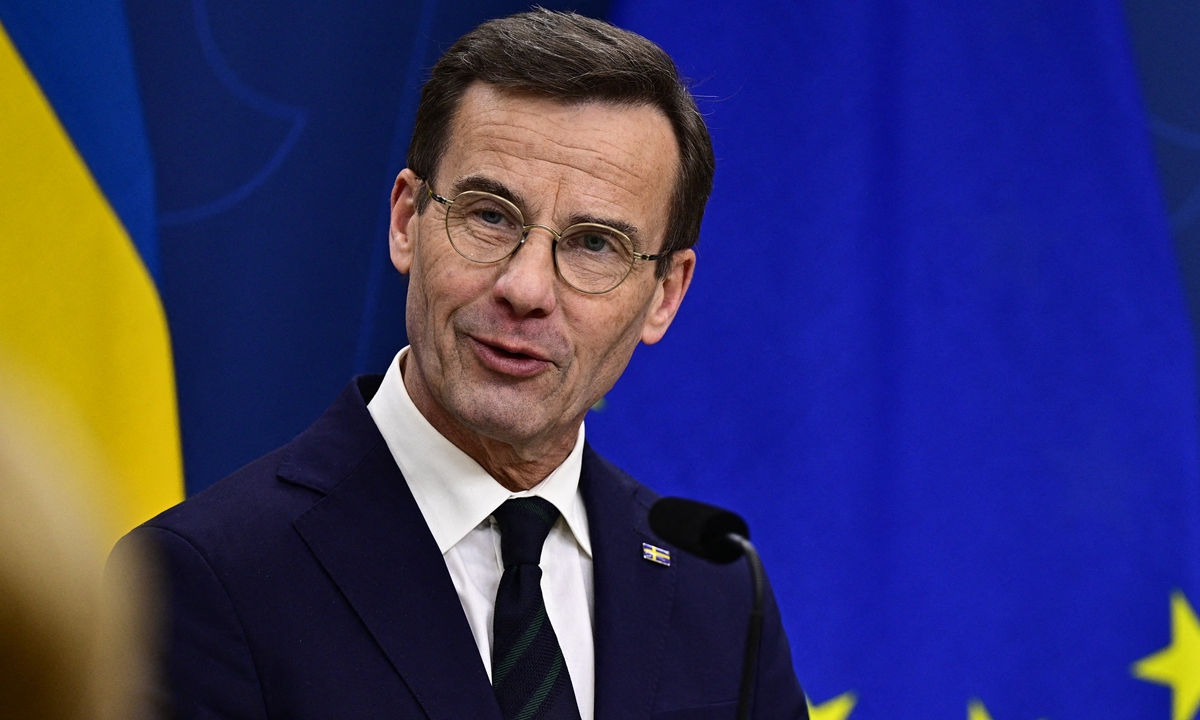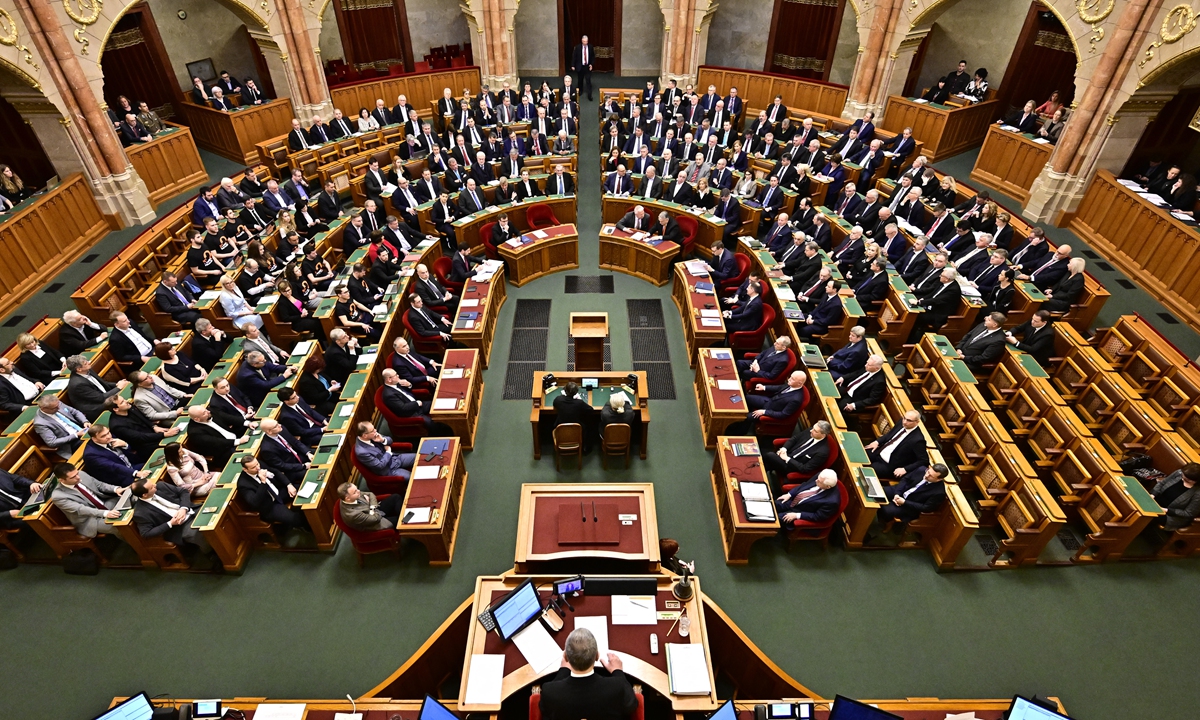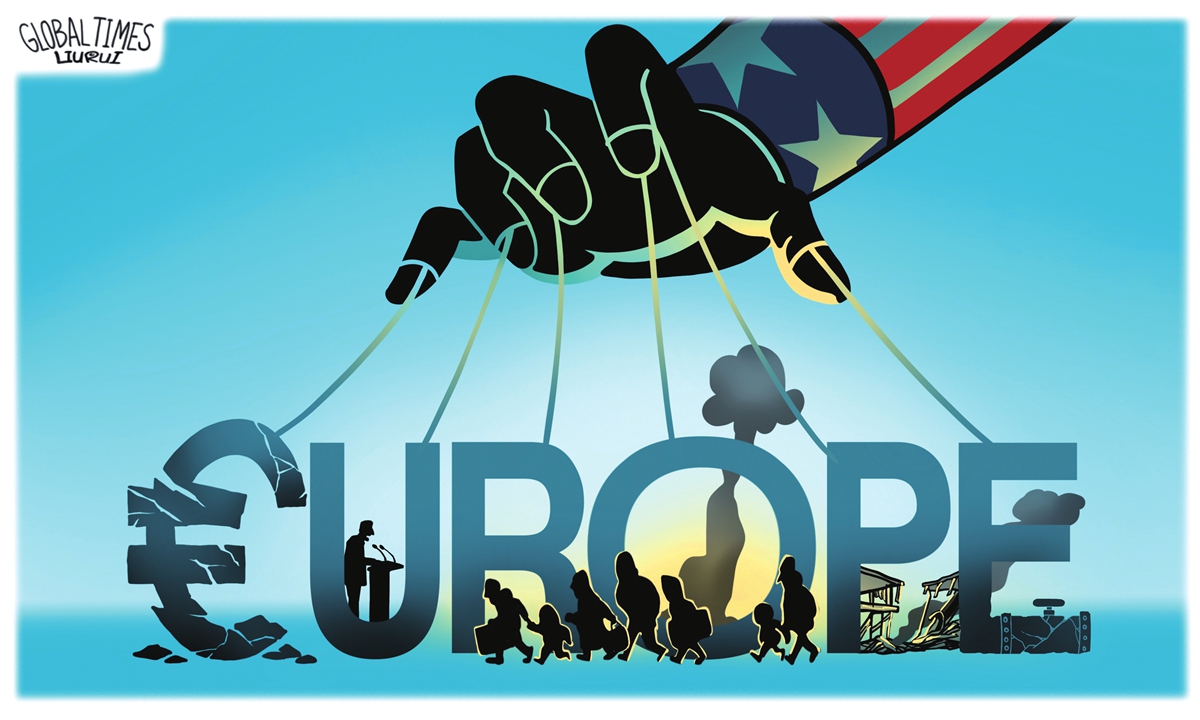Sweden's accession intensifies Russia-NATO tensions
European countries want to reduce reliance on US amid Ukraine crisis: experts

Sweden's Prime Minister Ulf Kristersson during a press conference at the government headquarters in Stockholm, Sweden, on Feb. 26, 2024, after Hungary's parliament on Monday voted yes to ratify Sweden's NATO accession.Photo: AFP

Representatives vote on the ratification of Sweden's NATO membership at the Hungarian Parliament in Budapest, Hungary on February 26, 2024. Hungarian Parliament approved Sweden's NATO membership on the day, essentially sealing the deal. Photo: VCG
Sweden has eventually cleared the path to join NATO, and following Finland, the Nordic country's accession to the US-led military alliance means that the boundary of military standoff between Russia and NATO in Europe has expanded to Arctic region, making the security situation of Europe more complicated and unstable, said analysts.
European countries are now considering sending ground forces to fight Russian troops in Ukraine, as France raised such idea recently to prevent Russia from winning the war, and experts said the danger of war escalation is increasing, and European major powers are trying to strengthen their own defense capabilities and reducing reliance on the US through more direct intervention over the Ukraine crisis.
On European security, China hopes that all parties will work for common, comprehensive, cooperative and sustainable security, follow the principle of indivisible security, and build a balanced, effective and sustainable security architecture through dialogue and negotiation and on the basis of respecting each other's legitimate security concerns, so as to realize peace and lasting security in the region, Chinese Foreign Ministry spokesperson Mao Ning said in response to inquiries concerning Sweden's accession to NATO.
"On China-Sweden relations, our position is consistent. We value our friendly cooperation with Sweden," Mao remarked at a routine daily press conference on Tuesday.
NATO expansion
With Hungary's parliament voting to ratify Sweden's bid to join NATO, the Scandinavian nation is set to join 31 other countries in the alliance, media reported on Tuesday. After nearly two years of negotiations, Sweden follows Finland, which was accepted into NATO last year. The countries applied to join at the same time in May 2022, but Hungary and Turkey both objected to Sweden joining.
The Nordic country's entry into NATO was momentarily paused with opposition from Turkey, but the country eventually agreed to support Sweden's bid to join the organization, according to the Associated Press. Sweden's final hurdle was removed Monday, when Hungary at last voted to approve the nation join NATO.
Cui Heng, a scholar from the Shanghai-based China National Institute for SCO International Exchange and Judicial Cooperation, told the Global Times on Tuesday that "the Finland and Sweden's accessions make the frontline of Russia-NATO military standoff extended to the Arctic region as now the Arctic Council members are all NATO members except Russia."
Chinese analysts said that NATO's latest expansion serves the US strategic demand to struggle with Russia in Arctic region, as in the past, NATO is unable to deploy weapons in the two non-aligned Nordic countries, and now due to the fear of conflict with Russia despite Moscow doesn't want to have tensions with Sweden and Finland, the US is able to contain Russia by deploying military presences in more regions in Europe.
Gao Jian, an expert on European studies from the Shanghai International Studies University, told the Global Times on Tuesday that "Russia's strategy in Baltic and Arctic regions is not offensive but defensive, but now with Sweden and Finland's accessions to NATO, Russia will be forced to strengthen military deployments in relevant borders, and this will add uncertainty for the security of Nordic countries as well."
Although the latest expansion makes NATO look more powerful, the US-led military alliance lacks sufficient capability to meet actual demands for security and defense for the whole of Europe, Gao said.
In other words, the expansion has "diluted" the strength of NATO, according to a Beijing-based military expert who asked for anonymity. When the US-led alliance needs to take care of more members, but its resources has been spent heavily in Ukraine, a non-NATO country, then the real strength that the alliance can provide to its members will be reduced and weakened, the expert said.
Europe's concern
Russia is now gaining advantage on the battlefield in Ukraine, and Kiev has failed to prove that its forces can effectively transform Western aids into victory against Moscow, more and more European countries are increasingly concerned. Also as the US might see a potential power transition later this year that could significantly impact US policy to support Ukraine, European major powers are seeking new measures to ensure that Ukraine will not be defeated so soon.
French President Emmanuel Macron said Monday that deploying Western troops in Ukraine is not "ruled out" in the future after the issue was being debated at a gathering of European leaders in Paris, the AP reported on Tuesday.
The French leader said that "we will do everything needed so Russia cannot win the war" after the meeting of over 20 European heads of state and government and other Western officials. "There's no consensus today to send in an official, endorsed manner troops on the ground. But in terms of dynamics, nothing can be ruled out," Macron said in a news conference at the Elysee presidential palace. Macron declined to provide details about which nations were considering sending troops, saying he prefers to maintain a degree of "strategic ambiguity."
European countries are becoming increasingly concerned as they have sensed that for the US, "Ukraine is something on the menu that can be used in trading with Russia," but for European countries, if Ukraine is sacrificed, any of them could be the next. Now, European major powers are now trying to play more direct role by adding inputs to the Ukraine crisis, "so that they can sit at the table rather than appearing on the menu," the anonymous expert added.
Li Haidong, a professor at the China Foreign Affairs University, told the Global Times on Tuesday that due to the collective defense principle of NATO, the idea of sending ground forces to Ukraine will face opposition within NATO over concerns of potential escalation.
If NATO members deploy troops in the name of the countries' armies rather than volunteers or militias, Russia might be forced to use more destructive weapons and flood more troops onto the battlefield, and the war will become more brutal and uncontrollable, so it's hard to predict the future of Russia-NATO tension, Li noted.


